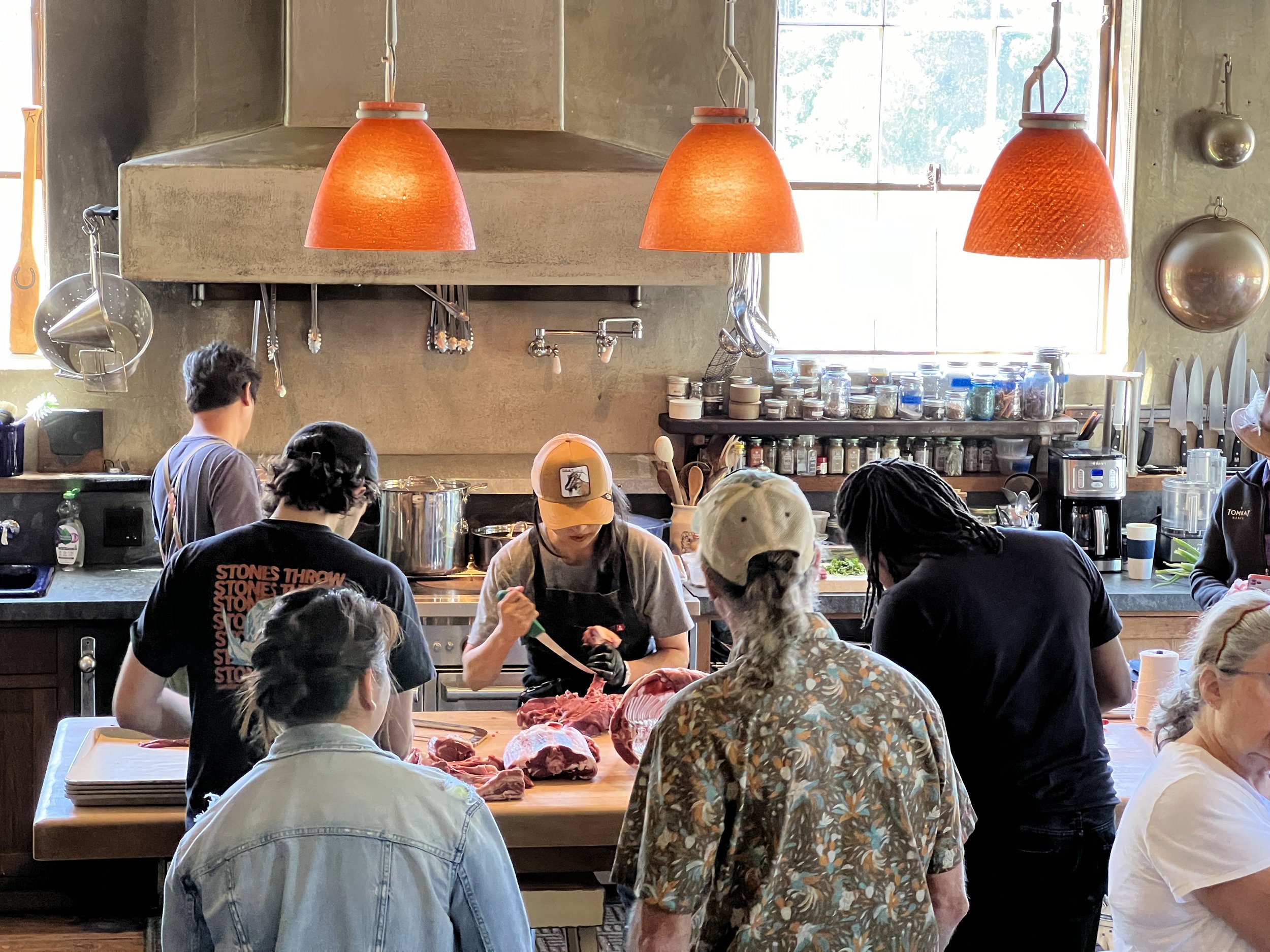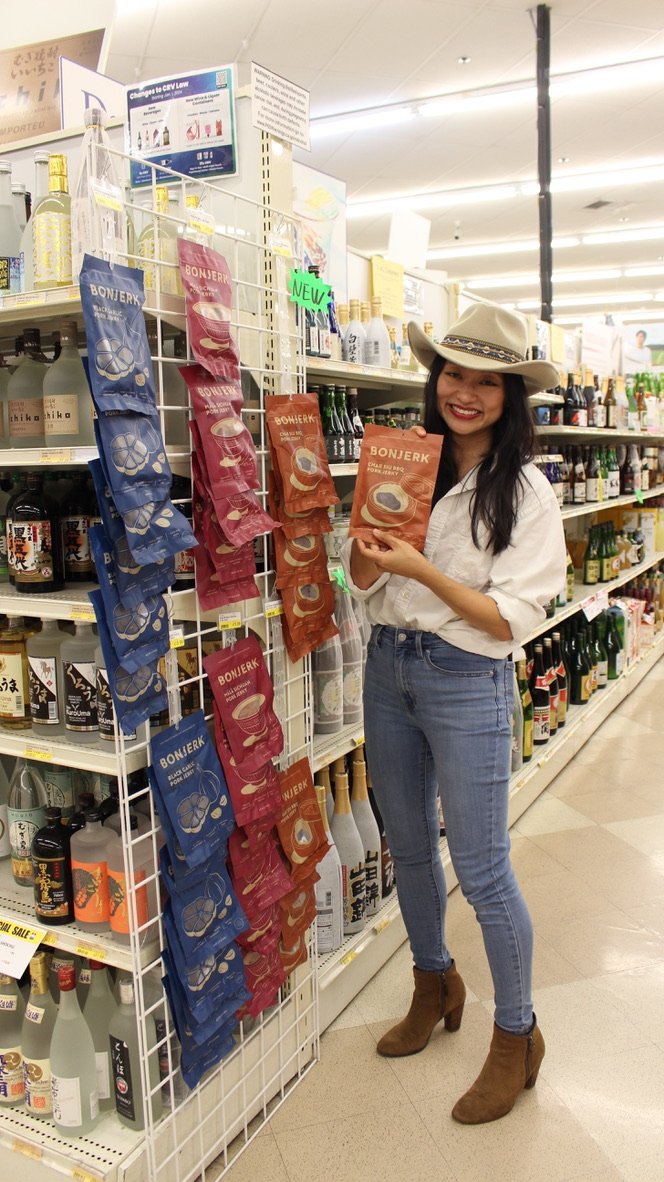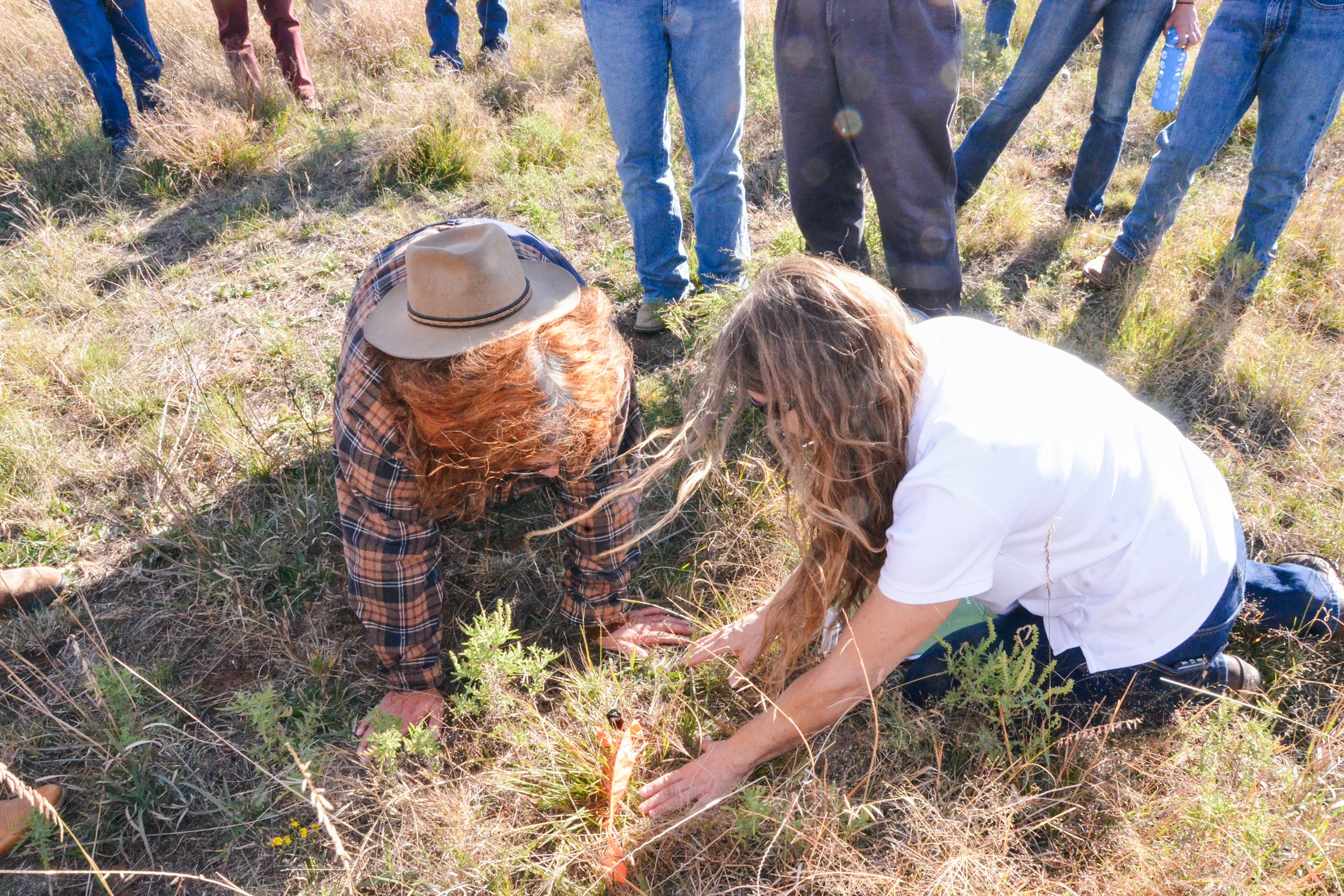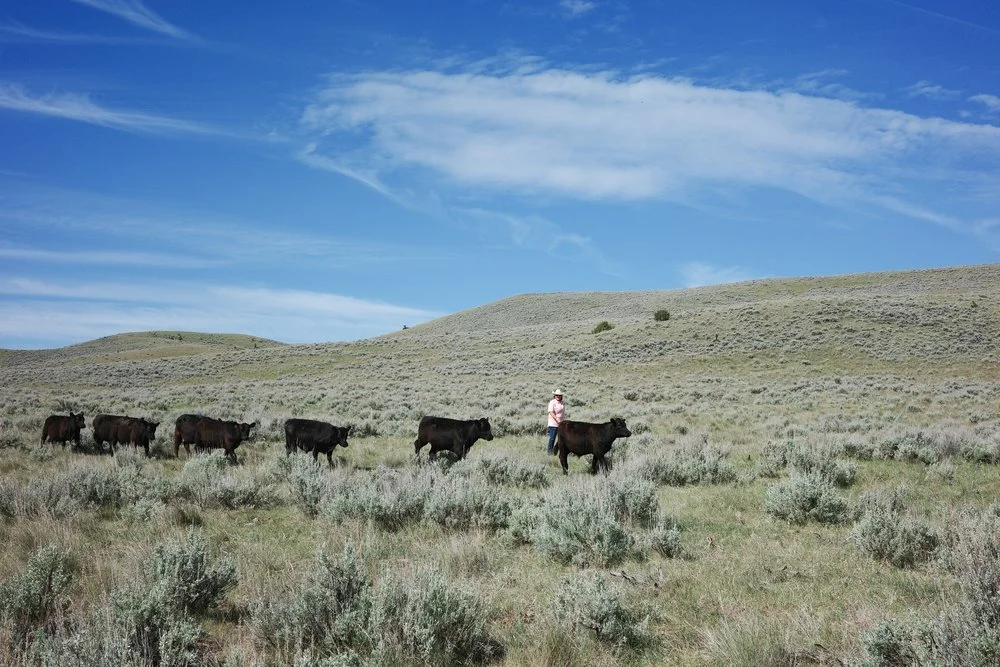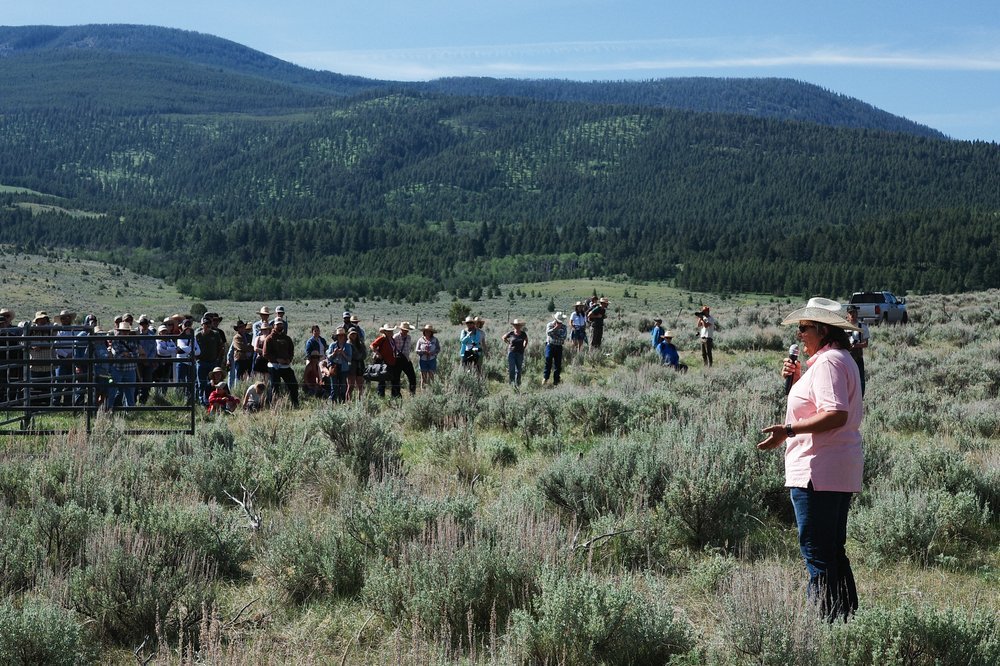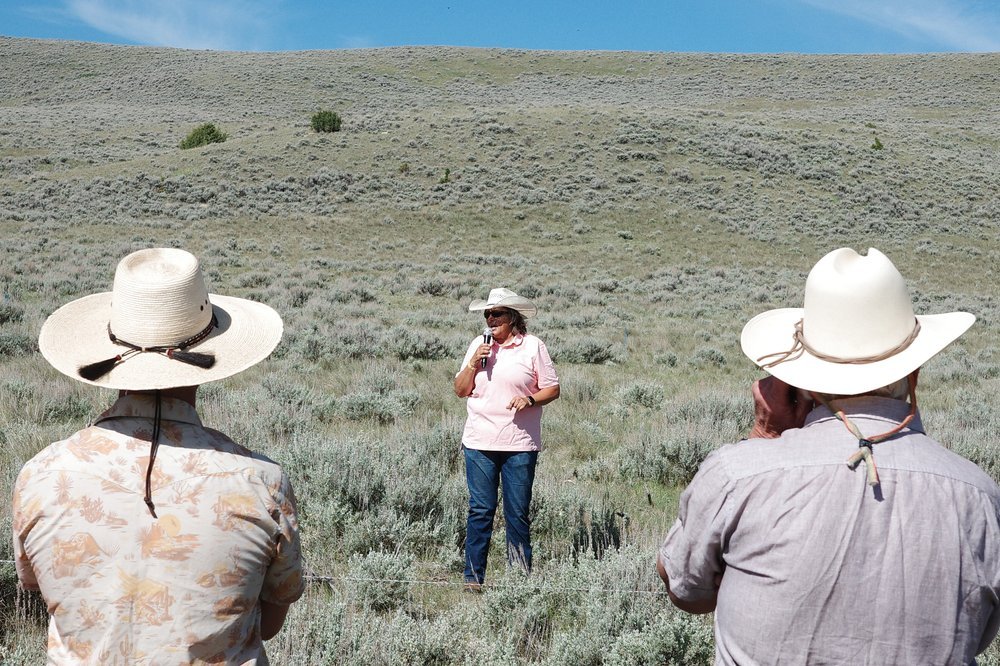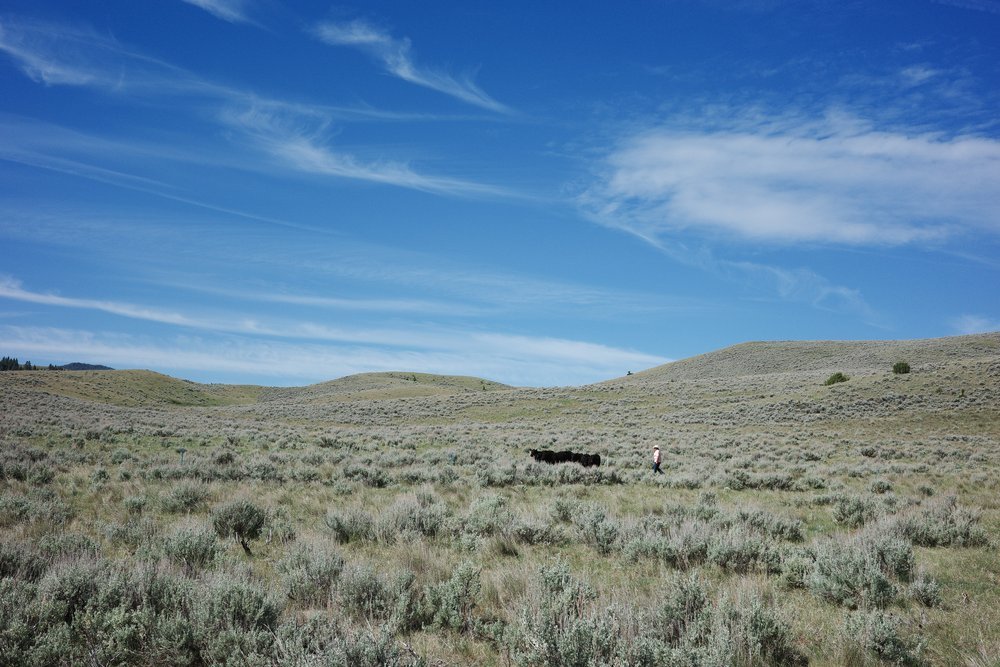Horses, Healing, and the Land:
Cheri Trousil’s Journey
At the crossroads of mind-body movement and land connection stands Cheri Trousil, a trailblazer in equine therapy. Through her work, Cheri offers women ranchers an extraordinary opportunity to reconnect with themselves and their land in profoundly meaningful ways.
Cheri’s journey is marked by diverse experiences and a deep-rooted love for nature. After growing up in a small rural town with no background in ranching or agriculture, she joined the military at 18. Eventually, she was drawn out west, where she pursued an education and career in physical therapy.
“It was a tough time for women in the military post-Vietnam, but I did it for the advancement in education. I had to push through, learned a lot, but ultimately, that decision and experience got me out west, where I began to actualize my belief that true healing happens outdoors,” Cheri reflects.
After completing her education, Cheri spent most of the year working indoors within hospital walls, but as soon as summer arrived, she took healing outside, working at youth camps.
After getting married and having children, life led her and her family to settle in Steamboat Springs, Colorado. There, she played a pivotal role in saving an 11,000-acre ranch from development in 1999. This two-year preservation effort laid the foundation for a non-profit called the Humble Ranch Education and Therapy Center, where Cheri’s vision of integrating physical therapy with land stewardship came to life.
Additionally, for more than a decade, Cheri has been involved in the Chinese cultural practice of Qigong, a comprehensive system that teaches individuals methods to preserve their vital energy, cultivate it through specific practices, and consciously direct this energy within the body to maintain health, balance, and vitality (source: National Qigong Association).
For seventeen years, Cheri partnered with hospitals, schools, and other women to bring the mission of Humble Ranch to life, pairing children with varied abilities with horses for equine therapy. Soon after, it became clear that PTSD could also be well-served by equine therapy. Cheri’s operation expanded rapidly, and she was faced with the strategic decision to partner with another organization, prompting her to redesign what it meant to continue partnering with horses in her work.
“I use my background in physical therapy to help individuals connect with their bodies and the land, fostering a holistic sense of well-being,” Cheri explains.
That’s when Women In Ranching (WIR) came into focus. After being introduced to the Women In Ranching community, Cheri quickly connected with its members and integrated her leadership skills into facilitating transformative experiences.
Cheri was introduced to WIR through mutual friends and personal relationships. Her introduction to a facilitator role came when she was invited to partner with her friend and colleague.
“I was immediately drawn to the idea of women coming together to be on the land and find their place in the land and what it meant to them. This felt familiar to my own work and journey, so I was like, ‘I’m in.’”
Cheri’s commitment to supporting women’s leadership is equally passionate. She began facilitating circles, and shortly after, was asked to join the board of directors for the newly formed Women In Ranching nonprofit. She served as a board member for two years before transitioning into a full facilitator role. “Gathering with women on the land is my first love,” she says.
“When a woman feels that she belongs and trusts herself, the depth and breadth of her impact on her community and the natural world around her are immeasurable,” she notes.
Her goal is to create a space where women feel a deep sense of physical and mental presence in each moment—connected to themselves in a place of trust and authenticity. In that present moment, women can feel how they are in relationship with the land, with animals, and with others. “But to achieve that, you first need to feel what it’s like to be connected and in relationship with yourself.” she says.
By weaving physical therapy, equine partnerships, and land stewardship, Cheri creates meaningful connections that enable women and communities to flourish. Her workshops offer practical strategies that can be implemented into daily routines and have lasting effects that continue well beyond the sessions.
“At the Yellowstone Circle Gathering, I hope the women gathered experience what it feels like to be truly present—connected to themselves, the land, animals, and others,” she says.
Don’t miss the chance to join Cheri at our upcoming Yellowstone Circle Gathering!
Cutting Through the Layers
Anica Wu’s Butchery Story
Jerky completely changed the trajectory of Anica Wu’s life.
Her leap into whole-animal butchery started with an unexpected passion for making the perfect piece of jerky. Her journey began with kitchen experiments and a taste of the meat industry that would catapult her into a full career change and the founding of her successful Asian-spiced jerky company, Bonjerk.
“Walking into a butcher shop for the first time and feeling powerless and intimidated because I didn’t know what cuts to choose for jerky made me realize I needed to learn more,” Anica explains. Determined to become self-reliant, she immersed herself in the world of butcher shops, learning about meat and animal anatomy. Her commitment to understanding meat sourcing and animal welfare deepened her dedication.
Growing up as a first-generation Chinese American in Kansas, Anica’s family used food to preserve their cultural heritage and maintain their traditions. Her passion for meat, combined with the scarcity of high-quality options in American Chinese grocers, led her to pursue butchery. In 2018, she began training as a whole-animal butcher, marking the start of her journey into meat.
Embracing her identity as an Asian American woman, Anica has found a nurturing and genuine community within Women in Ranching, where her unique perspectives are valued and her contributions celebrated. Her involvement with Women in Ranching began serendipitously in 2022 when she was invited to teach a lamb butchery class at the PT Ranch Gathering in Ione, California—her first opportunity to share her expertise in whole-animal butchery. “The encouragement from Amber and the team has been vital,” Anica reveals. “Amber’s mentorship has guided me through challenges and helped me grow my business. The community’s support has been invaluable."
Anica’s upcoming dumpling-making workshop is more than just a cooking class; it’s a chance to experience a tradition that’s deeply valued in her Chinese culture. Making dumplings is all about bringing people together—it’s something families do as a group, from rolling the dough to folding the fillings. The process itself is just as important as the final meal, creating a space for sharing stories, laughter, and connection.
“In Chinese culture, making dumplings is never a solitary task; it’s a collective effort that strengthens family bonds and honors the spirit of togetherness.”
Her experience as a butcher adds depth to the workshop. “Being a butcher connects raising animals to consuming their products,” she explains.
As a butcher, she is committed to using every part of the animal and minimizing waste. “In my culture, we eat everything,” she says. Dumplings are an excellent way to apply this principle, allowing her to utilize a wide variety of cuts and parts of the animal that might be overlooked in Western cuisine. By drawing on her butchery expertise, Anica can transform cuts like the shoulder, belly, and even organs into flavorful dumpling fillings.
This approach not only honors the practice of using the whole animal but also educates on the diverse flavors and textures that different cuts of pork can offer, reinforcing the value of using every part of the animal.
Anica is no stranger to charting into the unknown. Venturing into the entrepreneurial world, she’s learned that creating a great product is just the beginning. Building a brand, scaling a company, and thriving involves a unique set of challenges and requires balancing many priorities. Despite this, she manages to humanize her experience and acknowledges the efforts of other women in her ranching community.
“I wish people would ask, ‘How are you doing?’ It’s such a simple question, yet it holds incredible power,” she says.
This question serves as a reminder that behind our daily grind, whatever it looks like, there’s a human being with emotions, challenges, and victories. Recognizing this reality helps foster a deeper connection, emphasizing that it’s just as much about the people involved as it is about the work—something she hopes attendees will take away from the workshop.
Don’t miss the chance to join Anica at our upcoming Yellowstone Circle Gathering!
Enriching Land and Empowering the Women Who Care for It
Kathy Frisch’s Journey
Leaving behind a successful career in technology, Kathy embraced the call of the land, driven by a deep-seated love for nutrient-dense, traditional foods. Starting with a humble homestead and the challenging task of homeschooling her daughters, she expanded her vision to managing a 250-acre ranch in Texas and mentoring other women involved in agriculture.
Kathy’s inspiration to work with animals and agriculture emerged at age 40, when concerns about her family’s health motivated her to seek better nutrition.
“I wanted to provide high-quality food and address health issues at their root,” Kathy explains. This drive led her to Holistic Management® and a complete career shift from technology to agriculture.
Her teaching approach focuses on hands-on learning and family involvement, which she believes are crucial for success. “With adults, the emphasis is on understanding their starting point and offering a client-directed experience,” she notes, highlighting the importance of engaging everyone in the learning process.
Kathy’s admiration for Amber and her vision for Women in Ranching led her to become involved in the organization. She values the holistic approach that combines education with personal development.
“Yellowstone offers a unique opportunity to create a space where women can connect deeply and grow both professionally and personally,” she says.
In her work with Women In Ranching, Kathy aims to showcase the producer’s efforts and foster an environment where women can connect with themselves, the land, and other women. She focuses on exploring themes of identity and empowerment, helping attendees clarify their niche and find fulfillment in their roles.
Effective communication, particularly nonviolent or compassionate communication, is a key element of Kathy’s approach.
“It involves understanding and addressing both personal and others’ needs, which can transform conflict into creative collaborative solutions,” she says, emphasizing the transformative power of effective communication.
While technical aspects like soil health, livestock handling, and grazing management are important, Kathy’s core mission is to empower and support people who are deeply rooted in the land.
“The grounding effect of this connection with the land supports the interpersonal work I value most,” she says.
Through her dedication to Holistic Management and empowering women, Kathy not only nurtures the land but also inspires a more resilient and connected community of women who steward it. Her work stands as a testament to the power of combining agricultural expertise with genuine human connection.
Don’t miss the chance to join Kathy at our upcoming Yellowstone Circle Gathering!
In the Quiet of the Fields
Exclusive Q&A with Dawn Hnatow: Her Journey to Low-Stress Ranching
In the heart of Montana, where the summer sun floods every inch of the landscape, where the tiny fingers of sagebrush grasp at you as you walk by, a large group of ranchers and curious onlookers, gathered for a lesson that would challenge long-held paradigms around cattle handling, with a woman leading front and center.
The Old Salt Festival in Helmville, Montana, welcomed its second year, gathering folks out on the Mannix Family Ranch for food, music, and, most importantly, education. The highlight? A hands-on demo, sponsored by Women in Ranching, on low-stress livestock handling by the renowned Dawn Hnatow, owner and founder of Cattle Up Stockmanship.
Against the backdrop of rolling hills and expansive skies, Dawn Hnatow stood ready next to a small group of anxious steers, grounding her audience who stood behind and leaned against the railings of the roundpen that was surrounding her and the animals. Her methods, influenced by the legendary and personal mentor Bud Williams, advocate for a fundamental shift in perspective—one that prioritizes understanding oneself to deepen understanding and cooperation with the animals.
"We have to consider the animal in the equation when it comes to trying to do our day-to-day work that needs to be done.”
Throughout the demonstration, Dawn emphasized that if it seems unglamorous, it means you were doing it right. This technique demanded patience, stillness, and, most importantly, self-awareness. Dawn explained that she doesn’t offer demonstrations much anymore because people are hoping for and expecting the impossible — something big and exciting to happen — which puts unfair pressure on the animals and the instructor.
One memorable moment occurred when Hnatow shared a personal story about her father on their family ranch. Despite traditional methods, she suggested a different approach to prevent cattle from breaking away. Her strategy proved successful, illustrating the power of low-stress handling and leaving her father astonished.
Though it wasn’t a change her father stuck with, she was proud to see that her simple suggestion had worked, and the cattle flowed through the gate with ease at a place that often caused the family grief. However, after that initial effort, Dad reverted to his old tricks and persisted in doing things the hard way. All us ranchers in the audience could relate well to this story of working with our own families.
In Conversation: An Exclusive Q&A with Dawn Hnatow
WIR: So, something we love to always start by asking folks is, what is your tie to the land?
Dawn: I was born and raised on a ranch. And right from childhood on, you know, it’s in the bone now. I've always had a love for open country, nature, and the people responsible for taking care of it. I'm deeply attached not just to land I've had control of but also to places like this. Being able to spend time here with the people, animals, and nature is truly a blessing.
WIR: Absolutely. With this specific demo, we’re curious to know what the biggest takeaway is that you hope folks watching and observing will take home and implement in their own process?
Dawn: I hope people come to understand that we must consider the animal in the equation when doing our day-to-day work. If animals don’t understand what’s being asked of them, they likely won’t respond the way we want. As humans, we are responsible for the outcome, so it’s up to us to change what we’re doing and learn how to work with these animals so they can be comfortable doing what we need them to do. We get our job done, and they do what we ask comfortably. Everybody wins.
WIR: We loved the anecdote you shared earlier about presenting this low-stress technique to your dad. Could you retell that story for us? Also, from your perspective, what did the outcome look like? Did it feel like an "I told you so" moment?
Dawn: On our ranch, there was a specific area where we gathered the cattle. It was a hill with a narrow, steep trail leading into a valley. Every time we approached, the cattle would break away and dash down that trail. My dad’s instinct was to ride up and block their escape. Little did he know, this tactic only made them turn and head for the opening he inadvertently created.
After working with Bud for some time, I finally convinced him to try something different. Instead of blocking the usual escape route, I asked him to ride up the opposite side. And of course, he looked at me like I was on something strange, but decided to humor me for the day. As we gathered the cattle and headed downhill, I could see him tempted to revert to his old ways. But he held steady and rode up the other side. The cattle calmly passed the usual escape point and continued into the open. My dad turned to me with a shocked expression, and I wished I had captured it on video! Despite his success that day, he couldn’t replicate it next time; old habits die hard.
WIR: That’s funny.
Dawn: It was really funny.
WIR: What was the conversation immediately after? Did he discuss it, or was it more of an acknowledgment with a silent agreement to never bring it up again?
Dawn: He didn’t say much, and I didn’t want to say "I told you so." Instead, he said, "Well, that was an easy gather."
WIR: We’re curious to know, as a woman in ranching and with our audience increasingly younger, what advice would you give your younger self looking back on your life now?
Dawn: I would say to anyone who dreams of doing this for a living: chase it hard because it's been the most rewarding, fulfilling, wonderful experience for me. I've been blessed in many ways, not the least of which was my exposure to Bud. It totally changed the trajectory of my life, you know?
“Going from working in a feedlot and wondering what the future held for a woman there, to realizing the sky's the limit—it's such a rewarding way of life that it's worth the sacrifices.”
I feel for younger generations who think money is everything, because I know plenty of wealthy people who are very unhappy. So if it’s your dream, if it’s something that you wish to do, find a place where you can do it and learn everything you can. You'd be shocked to know what opportunities will present.
WIR: And finally, we love asking this question: What's something about your work that you love but rarely get asked about?
Dawn: Oh, that’s a good question. For me, it’s about witnessing how this learning process can really change human relationships. I work with a lot of families and crews where there’s often a lot of tension and anxiety during production events because they're so volatile and unpredictable. Seeing these transformations in people’s lives, alongside benefiting the animals, which is my primary goal, is just really fulfilling and a lot of fun.
“It’s so rewarding when I get emails and texts from people saying things like, "Today's cattle work went smoothly; no one got upset, and even the kids stayed engaged for the whole process."
WIR: Dawn, thank you for this invaluable low-stress livestock demonstration and for taking the time to chat with us today. How can people find you and follow along on your journey?
Dawn: You can connect with me through my Facebook page, on Instagram, and my Website, Cattle Up Stockmanship. All my contact information is right there. If you have any questions or need help with anything, please contact me. I'll do what I can.
We extend our heartfelt thanks to Dawn and the Old Salt Festival team for inviting us to sponsor such a meaningful demonstration.
Looking ahead, we are excited to announce the upcoming 2nd Sustainable Ranching Event hosted by Colorado State University in Fort Collins, Colorado.
Limited tickets available, so reserve your spot quickly!
From Soil to Stars
In-Depth Soil Health Exploration and Stargazing on the Northern Cheyenne Reservation
In May, at our ‘Stars and Soil’ event on the Northern Cheyenne Reservation, we dedicated a day to hands-on learning and reflection with Cheyenne women land stewards.
This event, part of our Rooted in the Land program, featured an in-depth exploration of soil health through compaction testing and assessments, insights into plant uses from an expert ethnobotanist, and an exploration of Traditional Ecological Knowledge (TEK) shared by tribal members.
The day concluded with stargazing under a sky free from light pollution, where the group admired the Waxing Gibbous moon and listened to native star stories.
Photography by Miah Chalfant
Women in Ranching’s Rooted in the Land program centers Indigenous Women in Ranching, celebrating their knowledge and expertise. The program was developed by Indigenous women for Indigenous women and aims to empower them through knowledge transfer, cultivating skills for leadership and growth, and honoring cultural traditions through a series of engaging in-person and virtual events tailored to the unique needs of each community.
Women in Ranching aims to support Indigenous communities in perpetuating Traditional Ecological Knowledge through a shared understanding of our kinship roles, relatedness, and languages. We seek to articulate a sacred and sophisticated perspective of our relationship to the land that values creativity, innovation, and resilience, ultimately rooted in Indigenous knowledge.
Our programs are centered on healing and nurturing the wholeness of the women we serve. Through the lens of “Whole Woman Care,” we intend to nurture all aspects of a woman’s life, including physical, mental, emotional, social, and spiritual dimensions to promote overall well-being. Through whole woman care, storytelling, and elevating the culture particular to each of the two tribal nations identified above, we are increasing equity, elevating community, sharing power, and building the next generation of agricultural leaders.









